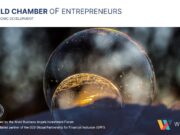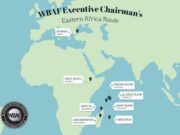Norris Krueger PhD, Senior Subject Matter Expert at OECD/EU distills the early-stage ecosystem down into ten research-backed takeaways; and outlines their implications for angel investors.
1 PRACTITIONER RESEARCH is ahead of academics in many ways (not just Kauffman, think Brad Feld). Two of my go-to gurus – Erik Pages and Don Macke – both have hoards of good research and tools.
Implication: We must cast our net widely when doing our homework.
Implication: Communities that connect outside their region do better. How can we fight the ‘Not Invented Here’ syndrome? How can we stay in touch? It seems the global nature of WBAF opens the door to learning so much from each other. Let us not miss those opportunities!
2 BRAD FELD’S KEY POINT is supported by research: No doubt, bottom-up matters.
Implication: In everything you do, keep a laser focus on how to keep it bottom-up; entrepreneur led!
2a) Unfortunately, the dominant thinking among policy makers is top-down. The Triple Helix argues that all you need is to bring together academe, government and industry groups; and then… Magic happens? Most cluster studies assume that it is the institutional players that matter most, despite all the evidence to the contrary.
Implication: Focus on how to get even your most powerful institutions listening and hearing what the entrepreneurs are really saying. WBAF members and Commissioners are uniquely positioned to do exactly that!
2b) Brad’s 2nd point, “be inclusive of the whole stack”, holds as well. Best payoffs aren’t gap-filling, but help multiple industries, types of venture, life cycle stages, etc.
Implication: How can we craft ‘rising tide’ strategies? Avoid overly targeted strategies? Again, we can learn so much from each other via WBAF.
3 KNOW THAT TRUE ECONOMIC DEVELOPMENT IS DISRUPTIVE
When most ecosystems take off, the ‘good old boy network’ gets disrupted, even subverted. But revolutions always have serious inside help.
Implication: They will fight back, but you can always find pro-disruption ‘double agents’. These people might be us, at WBAF!
4 ECOSYSTEMS ARE ABOUT PEOPLE That means focus on trust. Where communities get the right people on the bus (the trustworthy) and the wrong people off the bus (the untrustworthy, no matter how highly placed), then things move.
Implication: Be ruthless about starting with the deeply trustworthy. The ‘big tent’ is a mirage. Part of the genius of WBAF is we are starting with trustworthy people.
5 FOCUS ON THE CONNECTORS More importantly, focus on the super-connectors, the liaisonanimateurs who are proactive and great at connecting the connectors.
Implication: Understand the connectivity and find the selfless connectors. WBAF members should be very good at finding (and being) great connectors, and connectors of connectors.
“Focus on building
strengths, especially if
sustainable. Identify who
is best at various key
ecosystem roles, even
if painful.”
6 GOOD NEWS: MAPPING IS VERY GOOD (and roadmapping) according to research. Bad news: Most communities are terrible at it.
Implication: You need to check out Sourcelink and Rail. Also, when we talk, ask me about “Google mapping.” We need to get the great tools we already have into the hands of communities back home.
7 ECOSYSTEMS ARE NETWORKS (plural). It appears impossible for a community to move forward under one big umbrella (indeed, research is clear that the ‘big tent’ is a mirage). Think networks of networks that are connected and overlap to varying degrees; you have a financing ecosystem, a learning ecosystem, different industries, etc. Implication: Encourage the view that superconnectors really help, figure out how to
help them, and how to grow more. Connectors are people, not organizations. By the way, students could be your secret weapon!
8 ALIGN RESOURCES BY DISTINCTIVE COMPETENCIES
Research argues two counterintuitive things.
First, focusing on strengths (e.g., Asset-Based Community Development) works much better than trying to remediate weaknesses. Not politically popular, but it does work.
Second, distinctive competencies not core competencies. That is, ecosystem participants can’t focus on what they are best at (or what they prefer to do), but where they add the most value (just like in the marketplace).
Implication: Focus on building strengths, especially if sustainable. Identify who is best at various key ecosystem roles, even if painful (on that note: Universities are rarely, if ever, the best spots for entrepreneurial training).
9 METRICS MATTER
So, get them right… for you. You do get what you measure, so get good at measuring the right things, not the easy things. Focus on the dynamics; focus on the connectivity.
Implication: Check out the pros at this like Startup Genome and Sourcelink [p.s. and of course the Ewing Marion Kauffman Foundation]. WBAF needs them at our elbow
10 KEY DRIVERS of Entrepreneurial Economies, per the Global Entrepreneurship Monitor, are:
(a) How broad and deep is the understanding of the entrepreneurial mindset in prospective entrepreneurs? What about in the media, institutions, government, your mother?
(b) Entrepreneurial culture. How much of entrepreneurship and innovation is in the water? Usually, this means the ecosystem is healthy and growing. The first is human capital, the second is social capital. You need both.
Implication: How do you move all these pieces forward? Find synergies between human and social capital. How do we advance both?
Why does number 10 matter? The 2017 Kauffman State of Entrepreneurship Address emphasized three key foci: Entrepreneurship education, growing ecosystems, and zero barriers. Sounds like WBAF! Great minds think alike?
I would be remiss if I did not credit the recent ESHIP global summit on ecosystem-building, hosted by the Ewing Marion Kauffman Foundation for inspiring (and informing) this. Many of you reading this should consider applying to attend the 2018 event (and the Growing Entrepreneurial Communities event, hosted by the Federal Reserve Bank and Sourcelink in Kansas City). I would cherish your thoughts, criticisms, and additions.
Entrepreneur Up!



























